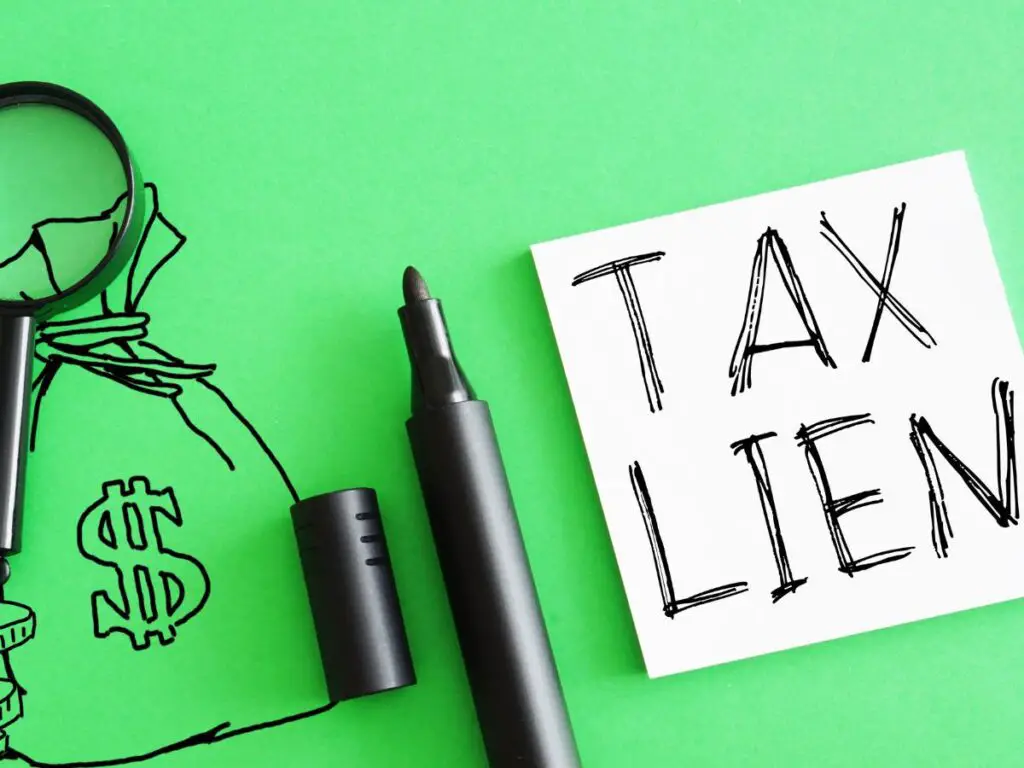Tax Lien Investing For Beginners

Want to dabble in real estate but don’t have deep pockets for large investments? Here’s an interesting fact: there was roughly $21 billion in unpaid property taxes across the U.S. in 2022, presenting a unique and viable investment opportunity known as tax lien investing.
This article will walk you through step-by-step what tax lien investing entails, how beginners can get started, evaluate the pros and cons, and vital tips for success. Excited? Let’s unearth this hidden gem of real estate investing together!
Defining Tax Lien
A tax lien is a legal claim on a property. This happens when the owner does not pay their taxes. The local government puts this claim on the property. They do this to make sure they get the money from the owed taxes.
These liens can stop properties from being sold or borrowed against until all taxes are paid off. Tax lien certificates are given out by local governments and private investors can buy them at an auction.
When you buy one, you are paying someone else’s unpaid taxes for them. This means they owe you that money instead of their local government.
Understanding The Tax Lien Process
Tax lien investing is a strategic process that starts when a local municipality creates a tax lien certificate for properties with outstanding taxes. The next step involves putting up the tax lien certificate at an auction, enabling investors to place their bids.
Once you’re successful in the bidding, control of the tax lien certificate transfers to you – this means paying off the amount owed in taxes. Following this, two scenarios might pan out depending on circumstances: either repayment by the defaulting owner during the redemption period or foreclosure.
A thorough understanding of these processes helps strategize your moves as you delve into tax lien investing, setting yourself up for potential success in real estate investments.
The Local Municipality Creates A Tax Lien Certificate
The town or city makes a tax lien certificate. This happens after a person does not pay their property taxes. A legal claim, called the “tax lien”, is put on that property. The local government lists all these unpaid tasks.
Then it creates tax lien certificates for each one.
This certificate stands as proof of the debt and starts to earn interest at once. Later, it may be sold off at an auction to investors who want to see high returns from the interest rate charges or even gain ownership of the property itself in certain situations.
By creating these certificates, municipalities are able to get back some of their lost revenue caused by unpaid property taxes.
The Tax Lien Certificate Is Put Up For a Tax Sale Auction
The local government sells the tax lien certificates to individual investors. Certificates are typically sold online but some sales also happen at a public auction. The highest bid wins the certificate. Sometimes, no one bids on a property lien funds and it goes unsold.
If this happens, the county takes control of the lawn certificate. Even so, many investors see these sales as great ways to make money because they can get high-interest rate returns in return for paying off delinquent tax obligations on properties.
Investors Bid On The Tax Lien Certificate
People make offers on tax lien certificates at public sales. The local government sets these up. They show the debts on a property because of missed tax payments. People may bid by offering to pay off the debt for an interest return or they might agree to buy for less than the full amount owed.
That’s called bidding down the rate. In some places, you can also bid on how much of the house you want to own if it goes into default and is not paid back soon enough.
Winning Investor Takes Control Of The Tax Lien Certificate
If an investor wins a bid, the tax lien certificate becomes theirs. This is key for real estate investors. It means that they have been given control over the property’s outstanding taxes.
Now, their money pays off those owed amounts to the local government. The investor now has a legal claim against the property at hand due to its delinquent tax obligation. Owning this document can make them feel secure in their investment plans.
Investor Pays The Amount Of Taxes Owed
After winning the bid, the investor pays the taxes. This step is key in tax lien investing. The sums paid cover all neglected property taxes and fees owed by the homeowner on that land.
This action gives control of the tax lien certificate to the investor. It’s like giving a loan to help pay back someone else’s debt.
This payment from investors helps the local government too. They get money needed for their work while homeowners get more time to pay what they owe.
Repayment Or Foreclosure
The investor gets their money back in two ways. One way is through repayment. This is when the owner of the property pays all of the taxes that are due. The second way is through foreclosure, which involves selling off the property to cover its unpaid taxes.
In both cases, the investor earns interest on their investment amount.
Pros and Cons of Tax Lien Investing
Discover the significant advantages such as high-interest returns and property acquisition possibilities that tax lien investing offers, while also exploring the associated risks like bidding competition, potential nonpayment, and unforeseen property issues.
Learn why striking a balance between rewards and liabilities is crucial for success in this type of real estate investing. Read on to gain more insights into this complex but potentially lucrative form of investment!
Pros of Tax Lien Investing
Investing in tax liens can offer many good things. Here is why:
- Less money needed: You don’t need a lot of money to start. This makes it easier for new investors to get into real estate investing.
- Steady return: Tax lien investing can give you a steady rate of return. It’s more predictable than other types of investing.
- More free time: Unlike some other real estate strategies, tax lien investing takes less time and work once set up.
- Score big: If the owner does not pay their debt, you could end up owning the property. For less than it’s worth!
- Help with taxes: The interest earned on your investment is subject to lower tax rates.
- Diversity is key: Adding tax liens to your investment portfolio can help distribute risk.
Cons of Tax Lien Investing
Investing in tax liens also comes with some drawbacks.
- This type of investing needs a lot of study. It can seem hard at first.
- Checking the property, flat, and their values is key before you buy a lien.
- You must know if there are other liens on the property. Otherwise, owning through foreclosure gets tough.
- You should visit the site to see recent tax sales and sale prices of properties.
- The info during your homework might be old. So getting an updated list of sites to buy closer to the date helps.
- Tax lien investing is tricky and knowing every detail matters.
- There are risks tied to tax lien investing. If the owner does not pay their taxes, you could lose money.
- Some owners might fight against losing their homes in court which can be costly and lengthy.
- There might also be problems with the site that need fixing after buying a tax lien certificate like damage or issues with the sewage system.
- Lastly, tax laws change often and those changes can impact your investment without a heads up! Knowing the laws well is important for successful tax lien investing. Do check for any new rules often as well as do your own research ahead of time to avoid surprises later on!

How to Begin Investing in Tax Liens
Kick-start your journey in tax lien investing by identifying a property type, reaching out to the local tax revenue office, and thoroughly examining potential properties. Discover more about how you can effectively venture into this real estate investment strategy in our next section.
Deciding On A Type Of Property
Choosing the right property lays the base for successful tax lien investing. It is crucial to know which kind of property you wish to invest in. The common ones include houses, land without any projects, and commercial properties such as offices or shops.
Consider your financial means and the level of risk you are ready to take on before deciding on a type of property. Some kinds may bring bigger returns but may also carry higher risks.
A visit not only gives more insights about its worth but also helps see if it can be sold easily later on. Assessing features like location, size, layout, and condition can aid in gauging its value better.
So, making an informed decision will ensure that later stages run smoothly and ultimately lead towards success in the tax lien investing journey!
Contacting Your Tax Revenue Office
Start by calling your local tax office. They have a list of properties with unpaid taxes. Ask them for this list. The people at the tax office can help you in many ways. They can tell you when and where the next auction will take place, too.
Researching Each Potential Property
Looking into each property is key in tax lien investing. You need to know what you are buying. Be sure to check if there is any harm to the land or things that may change its worth.
This forms a vital part of your inquiry.
Studying the area and the cost of properties close by will help you not buy a lien hard to gather later on. Also, keep an eye out for other liens on that property as this could make it hard to get title if there’s foreclosure.
Take time out to visit the property yourself and look at recent sales of like properties before making your decision.
Understanding the Difference: Tax Lien Vs. Tax Deed Investing
In the realm of real estate investing, it’s crucial to understand the fundamental differences between tax lien and tax deed investing. Here are the key points real estate investors need to consider:
1. Tax lien investing involves purchasing a lien on an owner’s property due to unpaid taxes.
2. Investors can receive a fixed return through interest or penalty payments by the property owner. a feature unique to tax lien investing.
3. In the case where the property owner doesn’t pay the outstanding taxes within the redemption period, the tax lien investor could potentially foreclose on the property.
4. Unlike tax lien investing, tax deed investing involves buying the actual property at a public auction.
5. In tax deed investing, the investor gains immediate ownership of the property after winning the auction.
6. Tax deed investments offer opportunities for physical property improvements and resale, unlike tax liens.
7. The returns on tax deed investments largely depend on the property’s condition and market value rather than a standard interest rate.
8. Due diligence plays a significant role in both tax lien and tax deed investing, requiring research on the property’s condition, location, and potential title issues.
9. Both methods provide investment opportunities for real estate investors, but choosing between them depends on the investor’s risk tolerance, capital availability, and hands-on involvement level.
10. Both tax lien and tax deed investing require upfront capital, however, tax lien investing often has a lower capital requirement.
11. Tax lien investing’s passive nature may appeal to investors seeking steady income, while tax deed investing might be more suitable for those who prefer a more hands-on approach and potentially larger returns.

Tips for Successful Tax Lien Investing
Be prepared with comprehensive knowledge about the property and its value, familiarize yourself with the local tax revenue officers, conduct thorough due diligence on available properties, and carefully analyze the risks involved before bidding for a tax lien certificate.
Remember to consider factors like the location and condition of the property as well as any potential returns on your investment. Finally, diversify your investments for maximum security and grasp well-defined processes coming from the municipality regarding interest or penalties along with principal repayment to gain success in Tax Lien investing.
Pro Tips For Buying Tax Liens
Buying tax liens can be a great way to grow your money. Here are some tips to help you make the best choices:
- Get to know the rules. Each state has its own laws on buying tax liens. Make sure you understand them.
- Find your target area. Look for places with many houses and high property taxes. These areas often have more tax lien sales.
- Research before you buy. It’s important to know about each property before bidding at an auction.
- Start with a small investment. Try not to put all your money in one place right away, divide it up instead.
- Have a budget and stick to it. Some auctions can be competitive, but don’t let that push you into paying more than what’s smart for you.
- Be patient after buying a lien certificate as per the IMPORTANT FACTS mentioned above, it will take about 120 days before you see returns from your investment.
- Consider joining or forming an investing group or working with an expert who knows about tax liens if you’re new to this type of investing.
- Keep track of all rules related to the redemption period which is the time given to homeowners for paying their unpaid taxes and any interest charged on them during this period.
- Always be ready with enough money if there are any unexpected costs coming up after buying a property at an auction.
- Take part in several auctions — both online and offline — so that you can understand how they work and make better choices later on.
Investing Passively Through an Institutional Investor
You can also put your money into an institutional investor for passive tax lien investing. This means you give your money to a big company that knows all about this kind of investment.
They use their knowledge and tools to buy tax liens with the hope of making profits. You don’t have to do any work, but you share in the returns they get.
Institutional investors can be banks, hedge funds, or private equity firms. They pool funds from many people to make big investments. These companies usually know what they are doing because they have trained experts who study markets and laws before putting down any cash on a lien certificate.
How Tax Liens Affect Mortgages
Tax liens have a big effect on mortgages. If you do not pay your property tax, the local government can put a lien on your house. This is their way to make sure they get the money owed.
Plus, it stops you from selling or refinancing your home until you pay up.
But what if there’s also a mortgage on this home? Well, here’s one big thing – when a house with tax liens gets sold at an auction, all other claims like mortgages get wiped out! So, let’s say you took out a loan to buy that house.
With the sale at auction and no more mortgage claims left, you might lose all of the money put into paying back that loan!
Here is another fact: after buying a tax lien certificate from an auction by paying off old taxes for any homeowner in trouble, sometimes these homeowners still can’t keep taking care of their houses and may stop giving money towards their mortgages during this period known as redemption time.
Now everything becomes bad for everyone involved. Usually, banks would step in and take over such homes when owners don’t make payments any longer but wait! Remember how we told you about where those properties first went up in auctions because of unpaid property taxes? Here’s some news – In these cases banks lose power too!
When a local government sells problematic properties through foreclosure, usually the only thing left is a new owner who won the bid at a public auction. Banks can’t collect any more money on loans connected to these properties, even if they held onto them until the very end. This is different from regular market transactions that follow industry standards and protect investors. It shows how tricky it can be to make smart investment choices that protect the interests of important stakeholders.
In the housing sector, which is mainly influenced by supply and demand, things can change a lot. This reflects how well the overall economy is doing. Balancing these factors keeps money flowing, helps businesses grow, and supports infrastructure development. It leads to better living conditions for more people and encourages innovation, ultimately bringing prosperity and leaving a positive legacy.
The Impact of Tax Liens on the Mortgage Process and Title Insurance

Tax liens can mess up a home sale. The buyer’s bank won’t approve the mortgage until all tax liens are paid off. This is because tax liens stay on the property, even after it is sold.
So, if you don’t pay your tax debt before selling the house, the new owner could have to pick up your tab.
Title insurance also gets affected by tax liens. Title insurers will not protect a home that has unpaid taxes tied to it. They do this for good reason as well! A clean title means no one else can claim ownership of the property or demand payment from you due to past debts like delinquent taxes.
Conclusion
Tax lien investing is a strong tool for anyone considering investing in real estate. This way, you may earn good returns while also helping someone save their house from auction. Practice and knowledge are the keys to success in tax lien investing.
So keep learning, bidding, and earning!
FAQs
1. What is tax lien investing for beginners?
Tax lien investing for beginners is a real estate investing strategy wherein you acquire the privilege to collect overdue property taxes from property owners, ultimately paving the way for potential property ownership once the specified term has elapsed.
2. How does a property tax lien auction work?
In a tax lien auction, investors bid on liens at real estate auctions. The winner gets a tax lien certificate and earns interest income if the owner pays back their debt.
3. What are some pros and cons of Tax Lien Investing?
The pros of tax lien investing include return on investment (ROI) through interest income, diversification in your investment portfolio, and possible ownership interest in properties if not redeemed by original owners while the potential risks include changes in Tax Lien Investing Laws, distressed properties may need costly repairs that might impact ROI.
4. Can I become an actual property owner through Tax Lien Investing?
Yes! If the owner fails to pay their delinquent property taxes along with any county’s payment requirements within the set time limit; You can get full ownership title or convert your lien to a deed via tax deed sales as per laws
5. Is upfront due diligence and research required before being involved in a bidding process at Real Estate Auctions?
Indeed! It’s crucial to conduct thorough research about the valuation of Investment Property and other factors like hidden costs associated with neglected properties that might alter overall returns bound by asset rules.
6. Who can participate in these types of Real Estate auctions for buying distressed assets such as Houses with Tax Lien?
Anyone who meets preregistration requirements set forth by the city or county treasurer’s office can take part – this ranges from novice buyers embodying financial literacy goals looking into alternative investments up to larger-scale accredited investors hunting substantial asset gains.